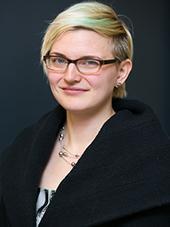-
About
- Departments & Offices
-
Academics
- Public Health
- Biomedical Sciences
- Physician Assistant
- Special Master’s (MBS)
-
Admissions & Financial Aid
- Tuition & Fees
-
Student Experience
-
- Student Resources by Program
- Academic & Student Support
- Wellness & Wellbeing
- Student Life
- Events & Traditions
-
-
Research
- Research Labs & Centers
- Tufts University-Tufts Medicine Research Enterprise
-
Local & Global Engagement
- Global Health Programs
- Community Engagement
Our Alumni: Char Kasprzak
"The Tufts MPH Program was where I could learn to understand the health care system from a social justice perspective."

I am the Statistical Data Analyst at Massachusetts Health Quality Partners (MHQP), a consumer-focused organization that turns health care data into meaningful information so people can learn about the quality of primary care in our state. As the senior data analyst at our small nonprofit firm, I do everything from data cleaning to working with collaborators to ensure that they understand our data when they use it, to doing statistical analyses and interpreting and writing about the findings.
What inspired you to pursue an MPH in your area of specialization?
I learned the foundations of survey research and statistics during my undergraduate education and wanted to have an even more solid education to apply myself in that type of role. From another angle, I had some less-than-ideal experiences interacting with the health care system, so I acquired a personal interest in systemic improvements.
What drew you to the Tufts’ Program?
I remember going to an event for prospective students where Dr. Tony Schlaff suggested that when leaders speak on health care we need to listen and hear whether health care is a right for all people or a privilege for the few. This idea of healthcare as a social justice issue was new for me, and I realized then that the Tufts MPH Program was where I could learn to understand the health care system from a social justice perspective.
From a practical perspective, I reviewed a list of classes required to complete the epidemiology and biostatistics concentration and confirmed that these would build a bridge between the skills I already had, and my career goals. Tufts made it possible to start the program part-time while I was still working full time. I was able to complete my first three classes this way, and this enabled me to make sure that this was the direction I wanted to go in before pursuing completion of my degree full-time.
How did your Tufts degree help prepare you to work in the field?
Besides refreshing and sharpening my statistical skills, I updated my survey research skills and I also learned epidemiological and economic concepts. I became a better writer, public speaker, and learned how to write a project plan and work on a coalition. I learned what the roles are of health care providers, health insurers, and policymakers at different levels of government, and who the people are in the health care landscape, and how they tend to interact with each other. This turned out to be a useful framework, since MHQP is a collaborative that brings players from each of these areas together.
What advice do you have for prospective students?
If you are reading this that means that you are already following my first piece of advice, which is to do your research. Poke around at the possibilities. Talk to people in your field. Also, just practically speaking, think realistically about the time and money commitment that this (or any) program entails. I feel that this program was worth it, and the further I go in my career the more I have touched upon various aspects of what I learned during my Tufts education.